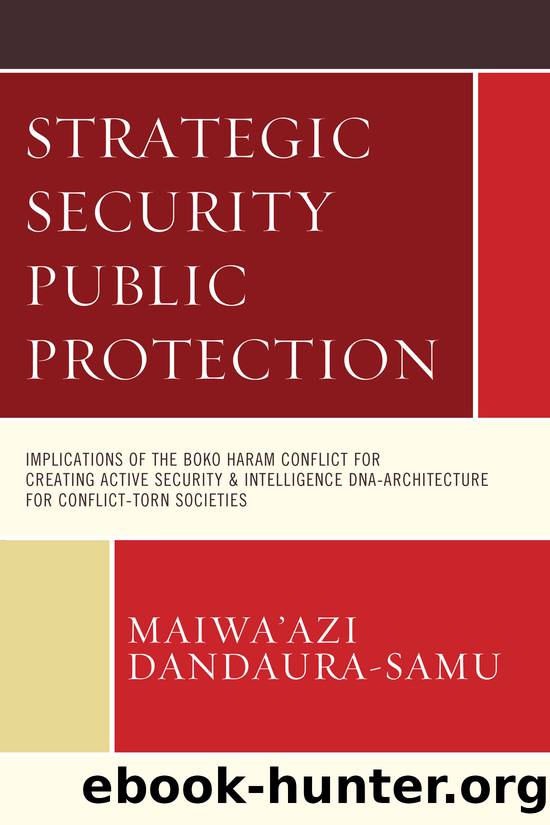Strategic Security Public Protection by Dandaura-Samu Maiwa'azi;

Author:Dandaura-Samu, Maiwa'azi;
Language: eng
Format: epub
Publisher: Lexington Books/Fortress Academic
Intervention plans must only be made with as much collectable all-source intelligence. No war can be fully expressed and achieved without basic intelligence. That would amount to putting blind men as the nationâs fighting forces. Military intelligence must work in the incidentâs active phase with other intelligence agencies to enable a seamless comprehensive fusion of data. Skilful and useful intelligence information and data must be timely, accurate, relevant, unbiased, objective, and actionable. Collectors and analysts must avoid the politicization of mined data and information or products. Collectors and analysts politicize intelligence when they modify the true view of things to confirm the suspicions, fears, prejudices, and expectations of decision or policy makers, and other superiors. This can lead to severe errors that may destroy a government and its political future and also destroy lives and assets.
For the purpose of public protection from a BH-style security assault conflict, intelligence must be collected from any and every source necessary and available, including social media, wiretapping or eavesdropping where possible, phone messages, computer screening, website auditing, etc. to safeguard and protect the public from unsolicited damages. Most local intra-state violence incident management systems may not care much for SIGINT (signal intelligence), also known as COMINT (communications intelligence), or ELINT (electronics intelligence). FISINT (foreign instrumentation signals intelligence) may also not be too necessary in local intra-state intelligence except where the security assault conflict or war involves regional actors like BH who have international reach. Intelligence collection and analysis managers must subdivide the war arena and efficiently organize work and staff to make the most from the field. Staff safety and welfare must be paramount to encourage loyalty and faithfulness in intelligence information and data validity. The managers will constantly have to struggle against various bureaucratic powersâ excesses so as to keep the field staff working hard and performing at their peak. Intelligence field operatives must also work within the set sophisticated intelligence ROE and their professional ethics to avoid abuses. Most professional ethical doctrines are either deontological theory, based on rules, or consequentialist theory, that is attributable to the consequences of any action. The just war theory has also been used. The just war theory proposes that though war may be very terrible, it may not always be the worst option. Governments have the responsibility to protect their societies and the regions so as to create a world without hate and fear where human rights and the individualâs liberties and existence is not infringed upon. âThere may be responsibilities so important, atrocities which can be prevented or outcomes so undesirable they justify warâ (Guthrie & Quinlan, 2007, pp. 11â15). However, war must be morally justifiable. It must be fought only after looking at the causative issues through a series of lenses or criteria which must be met before any war to be embarked upon can be considered a just war. According to Guthrie & Quinlan (2007, pp. 11â15), the criteria are in two groups, âthe right to go to warââ (jus ad bellum) and ââright conduct in warââ (jus in bello).
Download
This site does not store any files on its server. We only index and link to content provided by other sites. Please contact the content providers to delete copyright contents if any and email us, we'll remove relevant links or contents immediately.
Spell It Out by David Crystal(36110)
Life for Me Ain't Been No Crystal Stair by Susan Sheehan(35801)
Cecilia; Or, Memoirs of an Heiress — Volume 1 by Fanny Burney(32546)
Cecilia; Or, Memoirs of an Heiress — Volume 2 by Fanny Burney(31943)
Cecilia; Or, Memoirs of an Heiress — Volume 3 by Fanny Burney(31929)
The Great Music City by Andrea Baker(31916)
Professional Troublemaker by Luvvie Ajayi Jones(29650)
The Secret History by Donna Tartt(19052)
We're Going to Need More Wine by Gabrielle Union(19034)
Twilight of the Idols With the Antichrist and Ecce Homo by Friedrich Nietzsche(18622)
All the Missing Girls by Megan Miranda(15951)
Cat's cradle by Kurt Vonnegut(15334)
Pimp by Iceberg Slim(14487)
Bombshells: Glamour Girls of a Lifetime by Sullivan Steve(14054)
For the Love of Europe by Rick Steves(13905)
Talking to Strangers by Malcolm Gladwell(13346)
Norse Mythology by Gaiman Neil(13345)
Fifty Shades Freed by E L James(13232)
The Social Justice Warrior Handbook by Lisa De Pasquale(12187)
